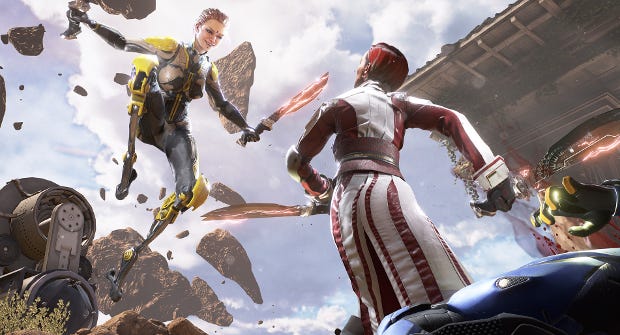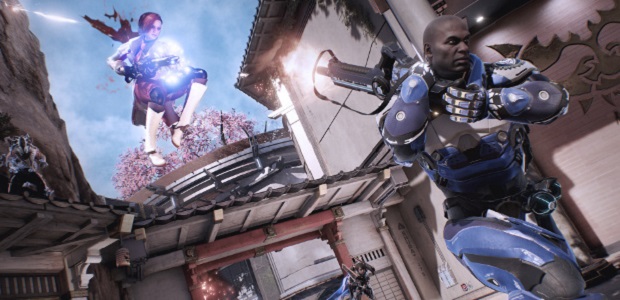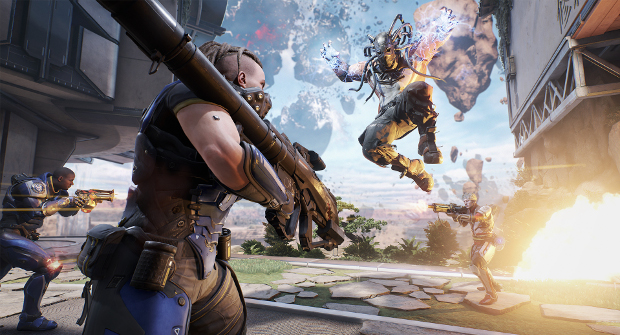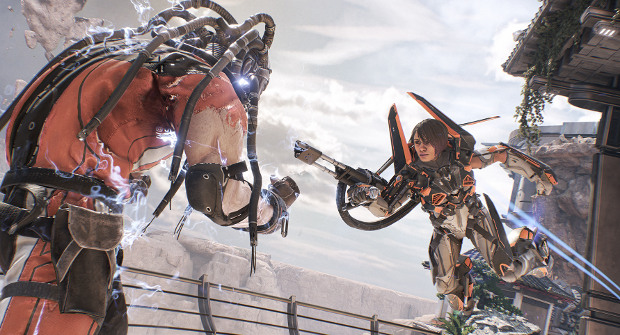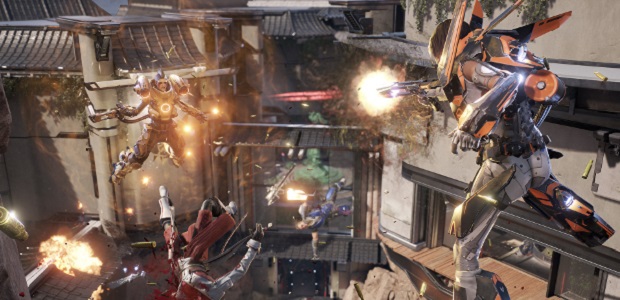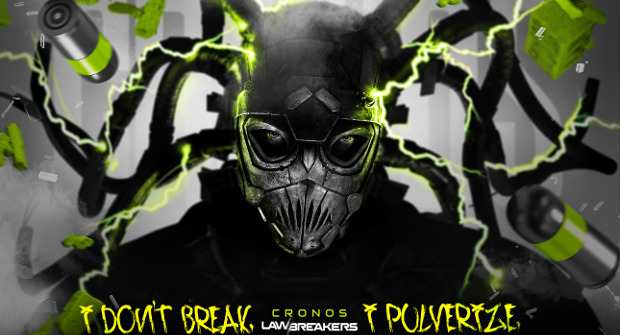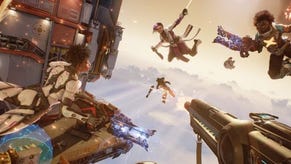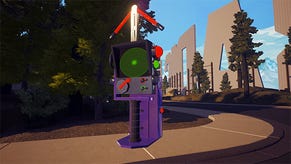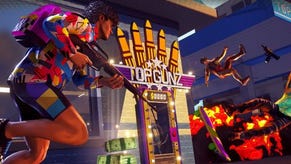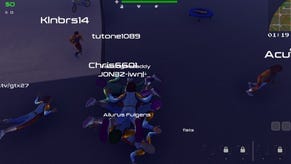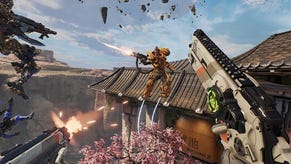No Bullshit: The Culture & Creativity Of Cliff Bleszinski's Boss Key Productions
Angels and demons
When we received an invite to visit the studios of Boss Key Productions, Cliff Bleszinski's new studio, we asked Rob Zacny to represent us. He was there to play Lawbreakers [official site], a game that he approached with some trepidation but the tense multiplayer action won him over. Given that Boss Key is an entire new creative venture for Bleszinski and his team, we wanted to know more. How does the studio work? What is it like to work with the man behind Gears of War, Unreal and Jazz Jackrabbit? And how do you make a salmon with legs?
Right at the front of the Boss Key Production employee handbook is the instruction: no bullshit.
"[Cliff] didn't want to be corporate," says art director Trammell Isaac, as he tries to explain what makes the new studio a unique place to work. "It's actually in the fucking rulebook, man. 'Do NOT bullshit anybody at this place'. And it's because he didn't want your typical corporate entity-feel to this place. He wants it to feel like more family, or a group of friends doing something all at the same time, working for the same goal."
Which sounds great, but also sounds like a different form of bullshit. To an extent it typifies the dilemma facing Boss Key, Cliff Bleszinski, and maybe even their first game, the gravity-bending competitive FPS Lawbreakers. On the one hand, there is a genuine desire to be different, to be better. On the other hand, most tech companies will claim that their culture is their competitive advantage while churning out the same old crap in conventional ways. Bullshit by another name.
It's easy to roll your eyes at Boss Key, the same way I was ready to dismiss Lawbreakers before playing it. But Boss Key comes by its affectations honestly, walking the walk in ways big and small. Take the setting they've chosen for their work: a century-old office building in downtown Raleigh, where the doors still bear the hand-lettered signs for the long-dead businesses and businessmen. It looks like a repurposed set from a Billy Wilder movie, and some Boss Key staffers like to call it the Boss Key Private Detective Agency.
It's also a huge pain in the ass.
"It's loud as shit. You go down the steps, they creak. A little while back we had to replace some of the boards on the floor, but they can't replace them!" Isaac says. "They have to take the old boards up, clean what's underneath, and replace them with the same boards. Because it's a historic building. So there's a set of rules they have to follow every time they fix anything."
A few different people during the studio tour complained about power surges and cuts thanks to the ancient wiring running through the walls.
"We have to have scheduled playtests. Like if you're going to play at your desk, only this side of the building can play at once," Isaac explains. "Get all those graphics cards fired up and you see some power shifts. It comes with some ups and downs. But the fact that you're talking about is the reason we are here. If this was any other regular space, you'd be like, who cares?"
Bleszinski has a love-hate relationship with the place ("Move into a historic place downtown, they said. It'll be fun, they said") but he sees it as an expression of his studio's own character. It's like "most of us at this studio. We've got character, but we're all a little janky," he says. "I wanted to go for something a little Silicon Valley-ish. I wanted to make something that was modern, but historic and cozy.
This feels like a place where I'd want to have a soiree at, in addition to rolling-up your sleeves. We're a little bit of the rebels. When you come in here and see this space, you immediately know we do things a little differently than a lot of game studios."
One of Bleszinski's gifts, one of the things that made him the face of Epic Games for a decade, is the fact that he never comes across as insincere. Coming across as completely unguarded and spontaneous, he still manages to hit boilerplate talking points.
I asked him why he was walking away from narrative games and back to arena shooters after Gears of War treated him so well. He explained that budget was the chief obstacle, but then offered this strangely-constructed anecdote, "I had dinner with Jason Rubin and his wife a few years ago, and Jason looked me in the eyes, and Jason, being the good looking alpha male that he is, said, 'Dude, if you hire one person every week for the next year, you're going to have 52 people. How are you going to compete with Uncharted?' And I thought, I don't want to compete with Uncharted."
But if Bleszinski can be a little self-regarding, his studio isn't built around his self-image. He has his vision and he wants to see it realized, but he also wants a place where people are free to speak their minds and push back against him.
I get a sense of how straight-from-the-shoulder Boss Key can be during the studio tour, when senior concept artist Jay Hawkins discusses his creative process in the context of a character he has come to hate: "the wings guy".
Jay was told to create a cool, James Bond-like secret agent kind of character for a new class, which he dutifully did only to be told that, "No, Cliff wants horns." So James Bond was out, and horns were in. The resulting character is pretty cool: rather than actual horns, the new character wears a stylized visor that, from a distance, makes it look like his face is encircled by horns and gives him a faintly demonic aspect.
But if there was a character that looked like a devil, Bleszinski thought, then there should be one that looks like an angel. So for the counterpart to this character, Jay needed to create a character with wings.
It's a vaguely uncomfortable moment on the tour as Jay basically complains about his boss and ideas that sound like they're cribbed from an early 90's Todd McFarlane comic. Jay is struggling to deliver the wings that Bleszinski wants while still making something that reads as cool, not kitsch.
I bring up the tension with Isaac at the end of the day, and what it's like dealing with mandates like Cliff's "horns and wings" demand.
"It's up to us to determine what those are. But those are the words coming out of Cliff's mouth: 'I want horns.' ...We have to be creative enough to be able to say, all right, Cliff wants wings. What can we give him that resembles wings that fits the character, and fits the world that we're trying to build? And that's where our job starts," Isaac explains.
"What we came up with, basically, is that the wings aren't there until that character does his thing, and then they show up. So at the end of the day, Cliff gets his wings which aren't actually wings, we can make a character that fits within the setting, that does not look like some kind of Archangel ripoff. And that's basically how every character works. Cliff comes up with some wacky idea — 'I want a salmon with legs!' — and we go, okay, he doesn't really want a salmon. Let's figure out exactly what he does mean."
Like his tastes, Bleszinski can sometimes seems a bit out of his time, and his employees have no compunction about letting him know that. But if Bleszinski often sounds like he's a game development one-percenter, the studio he's built reflects greater inclusivity and perspective.
It was striking how many people of color were in key positions, and Boss Key's offices seemed to have more obviously black and Latino developers than I find at a typical studio. Nobody called attention to it, but it was noticeably different from many other small studios I've visited. I'm not sure the gender balance is as good, and I was struck that one of Bleszinski's anecdotes about gender diversity involved an employee who has since departed, but there is an undeniably an effort on his part to break out of typical studio hiring patterns.
"I'm tired of working with white dudes. We've got that covered in this industry," Bleszinski says. "It's one of those things where any time anyone applies who is talented person for the job who is not a white dude, I'm like, 'Great!' Because if I want to depict a diverse cast, these people who aren't white dudes can bring interesting perspective to it."
When I ask Isaac about it, he says the studio lives up to those goals.
"It's a reflection of us," Isaac says. "And it's so that we can make a game that's inclusive without it turning into a stereotypical caricature of that person. Like, I give Cliff shit about this all the time, but Cole Train was a complete mess. Because he was a stereotypical African American: over the top, yelling, hooting and hollering-type stuff. And he took it to heart. After the fact, he didn't really like Cole Train. Because it was a stereotype, and he realized that after the fact.
"But here, we have the opportunity to run that past somebody who could be offended by that thing."
Isaac tells a story about another developer, a white guy, who was writing a black character. He was writing it so that the character would sound black, which is usually an express-ticket to unintentionally racist disaster.
"And I'm like, 'Just write the lines. And whoever we get as an actor is going to read that with the inflection of a black man.' ...So he started writing lines like I would just be writing these lines for myself. And once he did that, the person who plays Axel is a black dude, and he just sounds like a black dude because that's who we hired. And instead of him inventing what he thinks a black person should sound like, we went the other way. And we had that ability because have Josh and Chris and Lee and myself and Anthony all to reinforce that."
However, Isaac still says that those conversations can happen because Bleszinski has created a place where he expects them to happen.
That's no small thing. Isaac has been working on games since the nineties - including credits as lead artist on Fallout 2 and art director on Planetside 2 - and he knows the industry encourages silent acquiescence to whatever the people at the top are saying.
"We all know that everyone has been beat in the head with, 'Just be quiet and do your job.' Don't say nothing, don't rock the boat. We've been through that. Decades of people telling us this all the time. Now you put them in a scenario where they should be free? What do you think people are going to do? They're going to play it safe, because that's what they've been doing for decades," Isaac explains.
"So it has to come from the top. It has to come from on high. And people have to see examples of someone being outspoken with no reprisals. And you can see whether Cliff agrees or disagrees, but there's always a conversation."
I don't know if any of this will make Lawbreakers a better game, though I'd certainly say it's off to a strong start. But this an industry full of people who are skilled at saying the right things and expressing the right beliefs, and who then go off and create dysfunctional, exclusionary workplaces. Bleszinski sometimes say the wrong things - don't we all? - but with Boss Key, he seems to be doing the right things.
